cpp反汇编调试一
用例1:
#include<iostream> using namespace std; int main(int argc, char* argv[]) { //system("pause"); return 0; }
assembly:
#include<iostream> using namespace std; int main(int argc, char* argv[]) { ;以下是进入函数时的代码 010017B0 55 push ebp ;进入函数后的第一件事,保存原来栈底指针ebp 010017B1 8B EC mov ebp,esp ;调整当前栈底指针位置到栈顶 010017B3 81 EC C0 00 00 00 sub esp,0C0h ;抬高栈顶esp,此时开辟栈空间0xC0,作为局部变量的存储空间 010017B9 53 push ebx 010017BA 56 push esi 010017BB 57 push edi 010017BC 8D BD 40 FF FF FF lea edi,[ebp-0C0h] ;取出此函数可用栈空间的首地址 010017C2 B9 30 00 00 00 mov ecx,30h ;设置ecx为0x30 010017C7 B8 CC CC CC CC mov eax,0CCCCCCCCh ;将局部变量初始化为0xCCCCCCCC 010017CC F3 AB rep stos dword ptr es:[edi] ;根据ecx的重复次数,将eax的内容,以4字节为单位写到edi指向的内存中 010017CE B9 27 C0 00 01 mov ecx,offset _2755CF99_test@cpp (0100C027h) 010017D3 E8 3A FA FF FF call @__CheckForDebuggerJustMyCode@4 (01001212h) //system("pause"); return 0; 010017D8 33 C0 xor eax,eax ;设置返回值为0 } 010017DA 5F pop edi 010017DB 5E pop esi 010017DC 5B pop ebx 010017DD 81 C4 C0 00 00 00 add esp,0C0h ;降低栈顶esp,此时局部变量空间被释放 010017E3 3B EC cmp ebp,esp ;检测栈平衡,如果ebp与esp不等,则不平衡 010017E5 E8 32 FA FF FF call __RTC_CheckEsp (0100121Ch) ;进入栈平衡错误检测函数 010017EA 8B E5 mov esp,ebp ;还原esp 010017EC 5D pop ebp ; 010017ED C3 ret ;
ret跳转

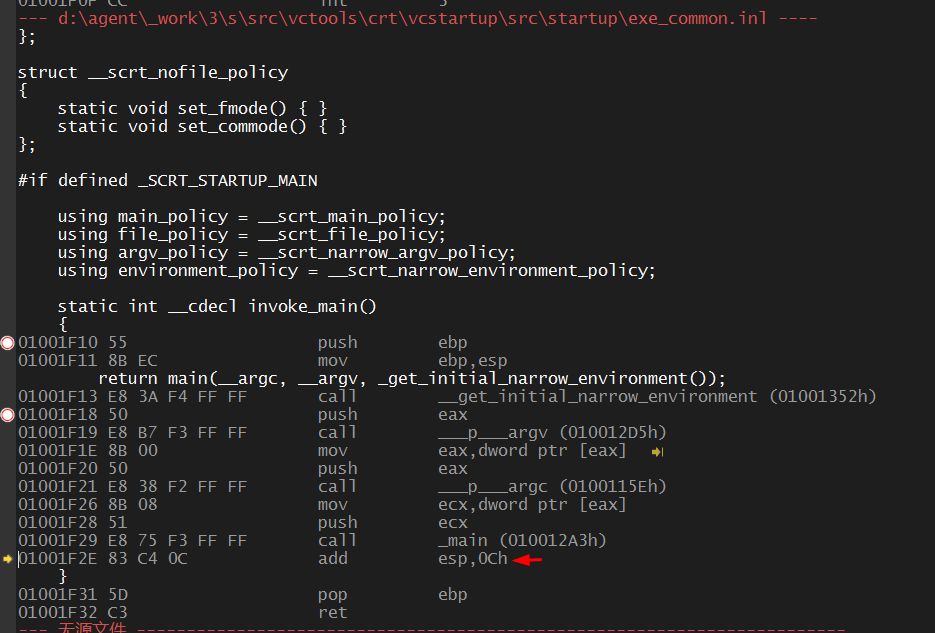
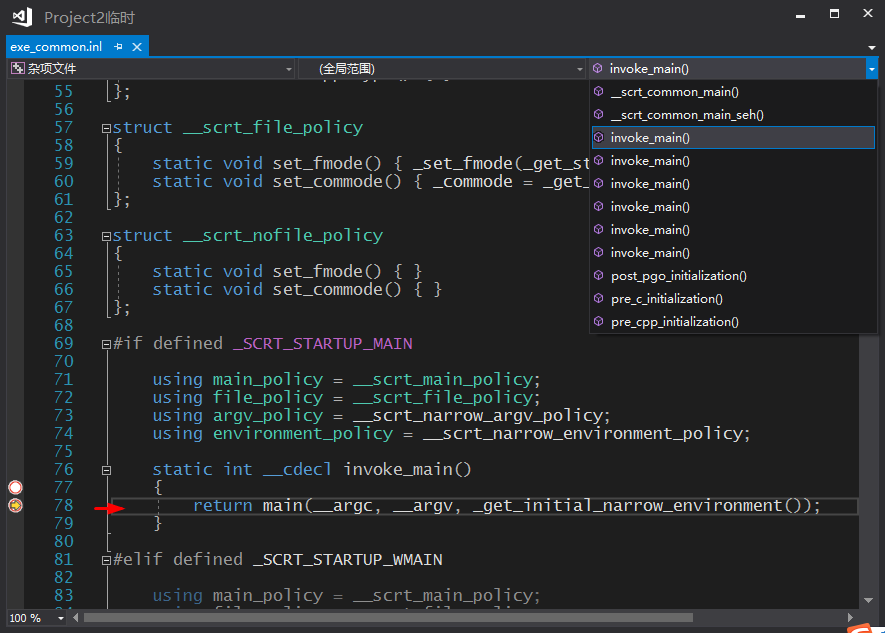
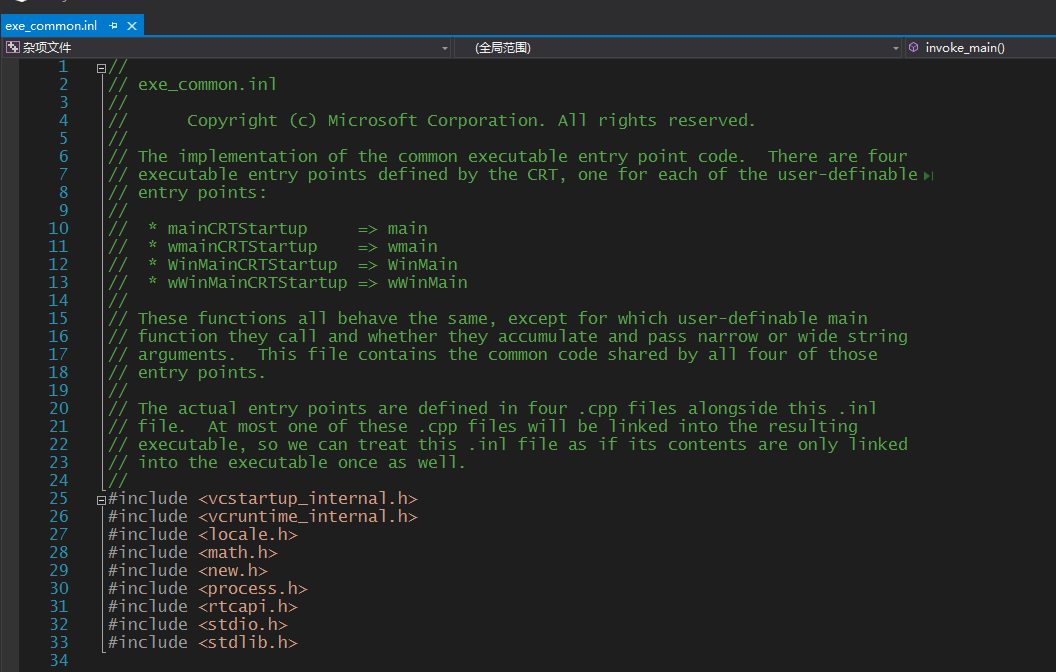


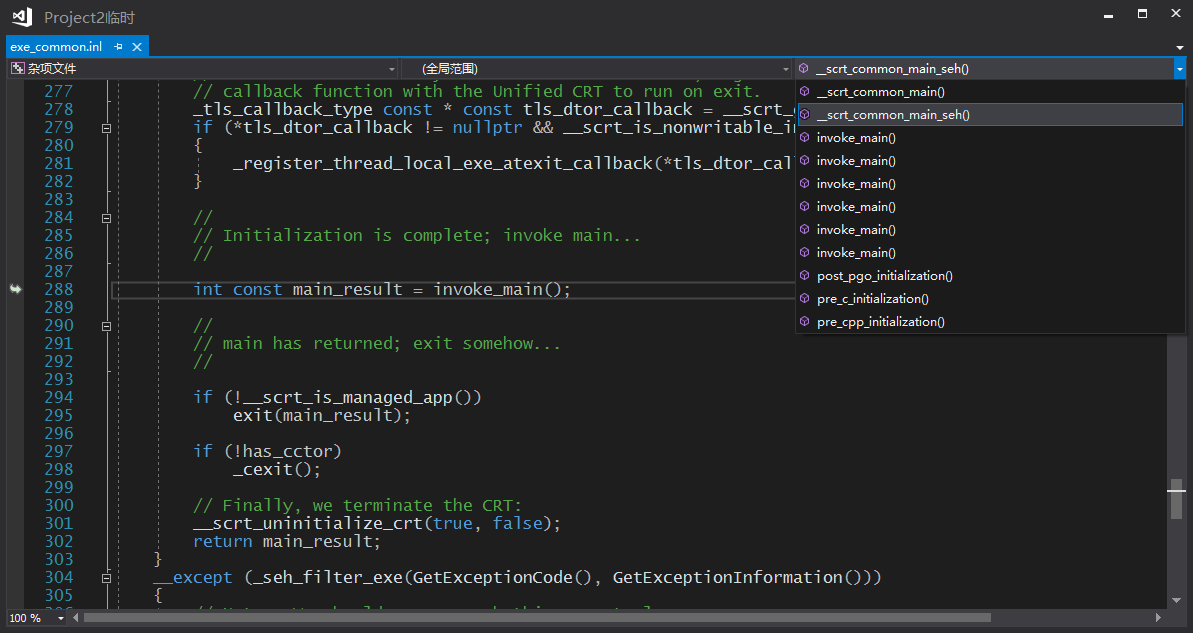
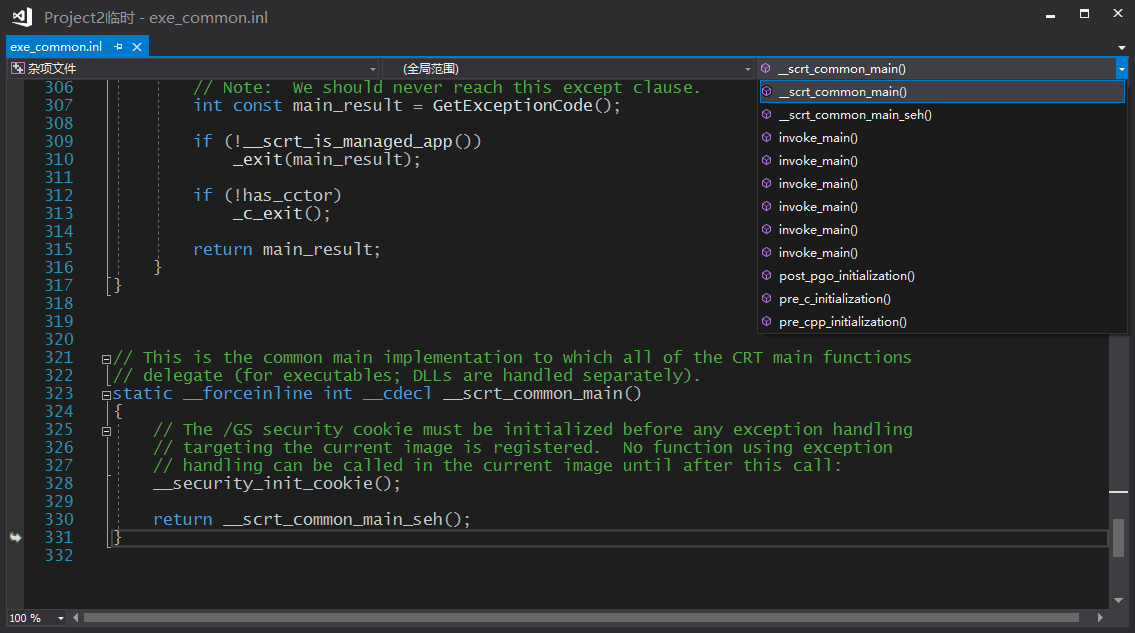
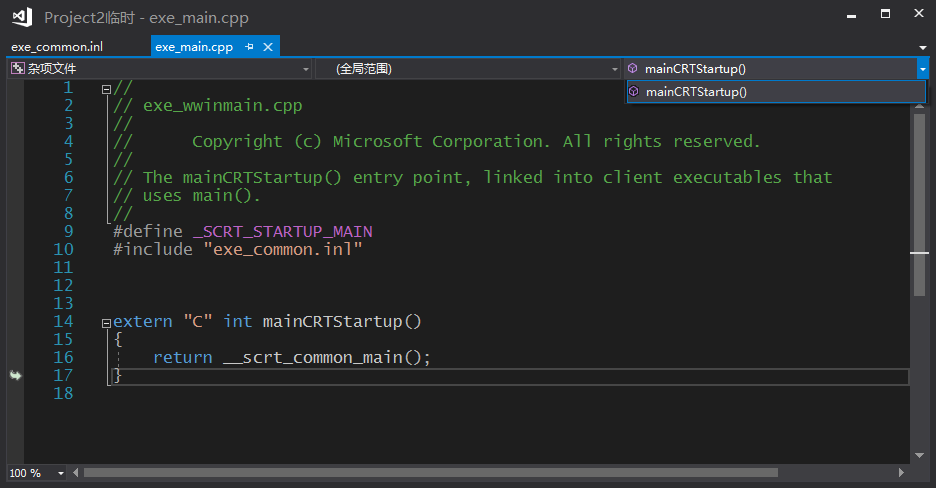
// // exe_common.inl // // Copyright (c) Microsoft Corporation. All rights reserved. // // The implementation of the common executable entry point code. There are four // executable entry points defined by the CRT, one for each of the user-definable // entry points: // // * mainCRTStartup => main // * wmainCRTStartup => wmain // * WinMainCRTStartup => WinMain // * wWinMainCRTStartup => wWinMain // // These functions all behave the same, except for which user-definable main // function they call and whether they accumulate and pass narrow or wide string // arguments. This file contains the common code shared by all four of those // entry points. // // The actual entry points are defined in four .cpp files alongside this .inl // file. At most one of these .cpp files will be linked into the resulting // executable, so we can treat this .inl file as if its contents are only linked // into the executable once as well. // #include <vcstartup_internal.h> #include <vcruntime_internal.h> #include <locale.h> #include <math.h> #include <new.h> #include <process.h> #include <rtcapi.h> #include <stdio.h> #include <stdlib.h> //-+-+-+-+-+-+-+-+-+-+-+-+-+-+-+-+-+-+-+-+-+-+-+-+-+-+-+-+-+-+-+-+-+-+-+-+-+-+-+ // // Common main()/WinMain() implementation // //-+-+-+-+-+-+-+-+-+-+-+-+-+-+-+-+-+-+-+-+-+-+-+-+-+-+-+-+-+-+-+-+-+-+-+-+-+-+-+ struct __scrt_main_policy { static void set_app_type() { _set_app_type(_crt_console_app); } }; struct __scrt_winmain_policy { static void set_app_type() { _set_app_type(_crt_gui_app); } }; struct __scrt_enclavemain_policy { static void set_app_type() { } }; struct __scrt_file_policy { static void set_fmode() { _set_fmode(_get_startup_file_mode()); } static void set_commode() { _commode = _get_startup_commit_mode(); } }; struct __scrt_nofile_policy { static void set_fmode() { } static void set_commode() { } }; #if defined _SCRT_STARTUP_MAIN using main_policy = __scrt_main_policy; using file_policy = __scrt_file_policy; using argv_policy = __scrt_narrow_argv_policy; using environment_policy = __scrt_narrow_environment_policy; static int __cdecl invoke_main() { return main(__argc, __argv, _get_initial_narrow_environment()); } #elif defined _SCRT_STARTUP_WMAIN using main_policy = __scrt_main_policy; using file_policy = __scrt_file_policy; using argv_policy = __scrt_wide_argv_policy; using environment_policy = __scrt_wide_environment_policy; static int __cdecl invoke_main() { return wmain(__argc, __wargv, _get_initial_wide_environment()); } #elif defined _SCRT_STARTUP_WINMAIN using main_policy = __scrt_winmain_policy; using file_policy = __scrt_file_policy; using argv_policy = __scrt_narrow_argv_policy; using environment_policy = __scrt_narrow_environment_policy; static int __cdecl invoke_main() { return WinMain( reinterpret_cast<HINSTANCE>(&__ImageBase), nullptr, _get_narrow_winmain_command_line(), __scrt_get_show_window_mode()); } #elif defined _SCRT_STARTUP_WWINMAIN using main_policy = __scrt_winmain_policy; using file_policy = __scrt_file_policy; using argv_policy = __scrt_wide_argv_policy; using environment_policy = __scrt_wide_environment_policy; static int __cdecl invoke_main() { return wWinMain( reinterpret_cast<HINSTANCE>(&__ImageBase), nullptr, _get_wide_winmain_command_line(), __scrt_get_show_window_mode()); } #elif defined _SCRT_STARTUP_ENCLAVE || defined _SCRT_STARTUP_WENCLAVE using main_policy = __scrt_enclavemain_policy; using file_policy = __scrt_nofile_policy; using argv_policy = __scrt_no_argv_policy; using environment_policy = __scrt_no_environment_policy; #if defined _SCRT_STARTUP_ENCLAVE static int __cdecl invoke_main() { return main(0, nullptr, nullptr); } #else static int __cdecl invoke_main() { return wmain(0, nullptr, nullptr); } #endif #endif static int __cdecl pre_c_initialization() { main_policy::set_app_type(); file_policy::set_fmode(); file_policy::set_commode(); if (!__scrt_initialize_onexit_tables(__scrt_module_type::exe)) __scrt_fastfail(FAST_FAIL_FATAL_APP_EXIT); #ifdef _M_IX86 // Clear the x87 exception flags. Any other floating point initialization // should already have taken place before this function is called. _asm { fnclex } #endif #ifdef _RTC _RTC_Initialize(); atexit(_RTC_Terminate); #endif if (argv_policy::configure_argv() != 0) __scrt_fastfail(FAST_FAIL_FATAL_APP_EXIT); __scrt_initialize_type_info(); // If the user provided a _matherr handler, register it with the Universal // CRT. Windows OS components cannot set a custom matherr handler (this is // a policy decision, to reduce complexity). #ifndef _CRT_WINDOWS if (__scrt_is_user_matherr_present()) { __setusermatherr(_matherr); } #endif _initialize_invalid_parameter_handler(); _initialize_denormal_control(); #ifdef _M_IX86 _initialize_default_precision(); #endif _configthreadlocale(_get_startup_thread_locale_mode()); if (_should_initialize_environment()) environment_policy::initialize_environment(); __scrt_initialize_winrt(); if (__scrt_initialize_mta() != 0) { __scrt_fastfail(FAST_FAIL_FATAL_APP_EXIT); } return 0; } static int __cdecl post_pgo_initialization() { // This function calls the __local_stdio_{printf,scanf}_options() functions. // These functions are defined in public headers with external linkage and // thus may be PGO-instrumented. We must not call these functions before the // PGO instrumentation library is initialized. __scrt_initialize_default_local_stdio_options(); return 0; } static void __cdecl pre_cpp_initialization() { // Before we begin C++ initialization, set the unhandled exception // filter so that unhandled C++ exceptions result in std::terminate // being called: __scrt_set_unhandled_exception_filter(); _set_new_mode(_get_startup_new_mode()); } // When both the PGO instrumentation library and the CRT are statically linked, // PGO will initialize itself in XIAB. We do most pre-C initialization before // PGO is initialized, but defer some initialization steps to after. See the // commentary in post_pgo_initialization for details. _CRTALLOC(".CRT$XIAA") static _PIFV pre_c_initializer = pre_c_initialization; _CRTALLOC(".CRT$XIAC") static _PIFV post_pgo_initializer = post_pgo_initialization; _CRTALLOC(".CRT$XCAA") static _PVFV pre_cpp_initializer = pre_cpp_initialization; static __declspec(noinline) int __cdecl __scrt_common_main_seh() { if (!__scrt_initialize_crt(__scrt_module_type::exe)) __scrt_fastfail(FAST_FAIL_FATAL_APP_EXIT); bool has_cctor = false; __try { bool const is_nested = __scrt_acquire_startup_lock(); if (__scrt_current_native_startup_state == __scrt_native_startup_state::initializing) { __scrt_fastfail(FAST_FAIL_FATAL_APP_EXIT); } else if (__scrt_current_native_startup_state == __scrt_native_startup_state::uninitialized) { __scrt_current_native_startup_state = __scrt_native_startup_state::initializing; if (_initterm_e(__xi_a, __xi_z) != 0) return 255; _initterm(__xc_a, __xc_z); __scrt_current_native_startup_state = __scrt_native_startup_state::initialized; } else { has_cctor = true; } __scrt_release_startup_lock(is_nested); // If this module has any dynamically initialized __declspec(thread) // variables, then we invoke their initialization for the primary thread // used to start the process: _tls_callback_type const* const tls_init_callback = __scrt_get_dyn_tls_init_callback(); if (*tls_init_callback != nullptr && __scrt_is_nonwritable_in_current_image(tls_init_callback)) { (*tls_init_callback)(nullptr, DLL_THREAD_ATTACH, nullptr); } // If this module has any thread-local destructors, register the // callback function with the Unified CRT to run on exit. _tls_callback_type const * const tls_dtor_callback = __scrt_get_dyn_tls_dtor_callback(); if (*tls_dtor_callback != nullptr && __scrt_is_nonwritable_in_current_image(tls_dtor_callback)) { _register_thread_local_exe_atexit_callback(*tls_dtor_callback); } // // Initialization is complete; invoke main... // int const main_result = invoke_main(); // // main has returned; exit somehow... // if (!__scrt_is_managed_app()) exit(main_result); if (!has_cctor) _cexit(); // Finally, we terminate the CRT: __scrt_uninitialize_crt(true, false); return main_result; } __except (_seh_filter_exe(GetExceptionCode(), GetExceptionInformation())) { // Note: We should never reach this except clause. int const main_result = GetExceptionCode(); if (!__scrt_is_managed_app()) _exit(main_result); if (!has_cctor) _c_exit(); return main_result; } } // This is the common main implementation to which all of the CRT main functions // delegate (for executables; DLLs are handled separately). static __forceinline int __cdecl __scrt_common_main() { // The /GS security cookie must be initialized before any exception handling // targeting the current image is registered. No function using exception // handling can be called in the current image until after this call: __security_init_cookie(); return __scrt_common_main_seh(); }



